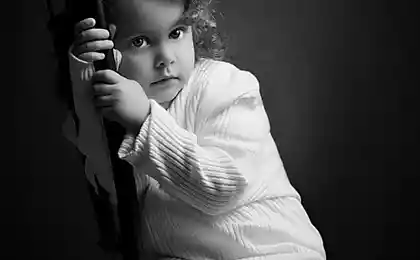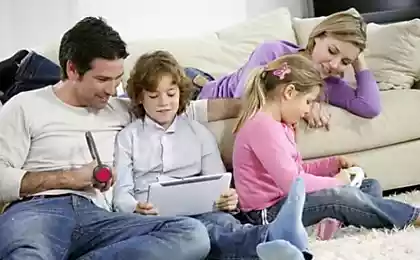178
It is absolutely forbidden to tell children
Sometimes, in a state of extreme irritation and dissatisfaction with the behavior of our children, we tell them words and phrases that children should not be told. Children often hear phrases from their parents such as:“If you keep acting like this, I’ll leave!”

© Elena Shumilova
The threat of “being alone” acts on the child like a sentence and literally means for him that he is now deprived of parental support and love, he is disliked, and mother now does not care what happens to him.
That is why you need to think carefully before throwing rash phrases.
“Don’t drink cold water or your throat will hurt.”
The throat hurts not from cold water, but from unspoken emotions/thoughts. If the child does not shut his mouth when he speaks, screams, cries, and also does not scold him for his words, emotions and ways of expressing them, then the throat will not hurt.
“Don't mess with food. ?
Children can't indulge at all. They learn the world and physical properties of objects, including food.
Don’t look so close or you’ll break your eyes. ?
What do you mean, break it? Vision deteriorates (becomes myopic) when unpleasant associations with the future are formed. For example, when an adult says rudely: “If you grow up, you will learn”, “you will grow up – you will understand how difficult it is to live / earn, etc.” And also vision becomes myopic when a person refuses to see details, also as a result of prohibitions on this. Children love to look at everything, touch everything, including on the street, and adults pull them, push them, demand not to mess around, not to pick. Parents in every possible way pull children out of the macrocosm into an adult boring life.
“Stop fooling/spoiling/running”
Why would that be? When else to fool around, but not in childhood? If you do not fool yourself properly in childhood, then this desire to “be a clown” will constantly come out in adulthood in the strangest forms and images against the background of the general seriousness of a person. It will also be accompanied by internal dissatisfaction.
"What are you talking about? Aren't you ashamed?!
It is very fraught to hang on the child shame and guilt. The adult thus resets his responsibility for himself, his condition, his level of consciousness, his method of upbringing on the child. And then the child lives with this foreign cargo, gets sick, becomes unhappy, angry with the world, begins to mock and malign.
Stop crying! Calm down!
It's like saying, "Stop cleansing your soul, leave the inner pain in you and live with it, pretend you're not hurt, deceive yourself." Uncried pain will always accumulate and make the child angry and callous.
"You fall, you hit, you hurt."
If you say that to a child, it will. These words are not a warning for the child, but facts that program his Consciousness for such an outcome. Instead of such phrases, you need to help the child try himself where he has not yet tried, give him a hand, provide support, instill confidence in his abilities and abilities.
"I don't love you."This is the worst phrase your child can hear. This is always a trauma for the baby, because such words convince the baby that “he is bad” and “no longer needed.” Never say that, but always emphasize that you love your child even when he behaves badly and capricious.
"Yes, who needs you?"A phrase often used by parents ostensibly to relieve a child of unfounded fears in response to a plea for protection: “Mom, a terrible monster wants to eat me.” Hearing this phrase, the child may think that other than you, he does not need anyone at all, and you do a great favor that you live with him. Such a conclusion can lead to low self-esteem, unsociableness, complexes and fear of communication. So when you help your child get rid of his or her fears, tell him or her that he or she is too dear to you to let any monster come close to him or her.
“If you don’t obey, a bad uncle will come and pick you up!”
A child with strong nerves and a good sense of humor, at best, will soon cease to react to such statements. But a more anxious baby can survive a severe scare and earn a phobia.
The only thing that parents will achieve as a result of the use of such phrases is increased anxiety, nervous breakdowns, deterioration of discipline and behavior in children. Building your authority on fear is a dead end, gaining trust and respect can be much more dignified and pleasant for you and your child in ways.
"You're bad!"
Child psychologists unanimously argue that you can not condemn the child, you can only condemn his actions and actions. You can’t tell a child that “he’s bad,” it’s right to say that he did “bad.” Young children do not question what we say, they unconditionally believe everything we tell them. If a child is constantly told that he is lazy, greedy and dirty, then do not be surprised that in the end he will behave accordingly.
“Nothing you can do – let me do it myself!”
This phrase preprograms the child for failure. Gradually, the baby has the confidence that he is a clumsy, awkward, incapable and stupid loser who is unable to do anything on his own without the help of his mother. Such a child is very unsure of himself. Never take the initiative. And why, because it will not work anyway. Therefore, if you hear from your child the statement “I myself!”, support the child in his aspirations, show patience and be sure to praise.
Trust only in yourself, no one will help you, because the world is against you.Such phrases can be heard from their parents by weak, insecure and physically weak children, whom parents are trying to accustom to independence and the ability to stand up for themselves. But in the end, the already frightening world for the child is even more threatening and even dangerous. The child becomes wary, distrustful, withdrawn, avoids communication with children and adults, because you never know where to expect a catch. It is important to form a positive view of the world in a child, and only mistakes in upbringing can set him against others.
“Why can’t you behave as well as your sister?”, “Petya has long been able to read, and you don’t even know the letters!” ? Such comparisons, especially with a brother and sister, are very painful for children and cause a sense of unhealthy rivalry. It is very important for children to know that you love them for nothing, not for acquired skills or special talents.
“Why are you still dancing so badly?” “Why didn’t you take first place?” Such phrases show children that they will never be good enough to meet all the requirements of their parents. To earn restrained approval, you have to jump above your head and never go below the top. Parents should remember that their approval is very important for children, especially in those moments when everything does not work out as we would like. "Third place"? That's great! Next time we will prepare even better! But I'm very proud of you!
The support and love of parents is the best motivation for success. published
Source: skylineru.net/realty/frazy-roditelej-daryashhie-detyam-kompleks.html

© Elena Shumilova
The threat of “being alone” acts on the child like a sentence and literally means for him that he is now deprived of parental support and love, he is disliked, and mother now does not care what happens to him.
That is why you need to think carefully before throwing rash phrases.
“Don’t drink cold water or your throat will hurt.”
The throat hurts not from cold water, but from unspoken emotions/thoughts. If the child does not shut his mouth when he speaks, screams, cries, and also does not scold him for his words, emotions and ways of expressing them, then the throat will not hurt.
“Don't mess with food. ?
Children can't indulge at all. They learn the world and physical properties of objects, including food.
Don’t look so close or you’ll break your eyes. ?
What do you mean, break it? Vision deteriorates (becomes myopic) when unpleasant associations with the future are formed. For example, when an adult says rudely: “If you grow up, you will learn”, “you will grow up – you will understand how difficult it is to live / earn, etc.” And also vision becomes myopic when a person refuses to see details, also as a result of prohibitions on this. Children love to look at everything, touch everything, including on the street, and adults pull them, push them, demand not to mess around, not to pick. Parents in every possible way pull children out of the macrocosm into an adult boring life.
“Stop fooling/spoiling/running”
Why would that be? When else to fool around, but not in childhood? If you do not fool yourself properly in childhood, then this desire to “be a clown” will constantly come out in adulthood in the strangest forms and images against the background of the general seriousness of a person. It will also be accompanied by internal dissatisfaction.
"What are you talking about? Aren't you ashamed?!
It is very fraught to hang on the child shame and guilt. The adult thus resets his responsibility for himself, his condition, his level of consciousness, his method of upbringing on the child. And then the child lives with this foreign cargo, gets sick, becomes unhappy, angry with the world, begins to mock and malign.
Stop crying! Calm down!
It's like saying, "Stop cleansing your soul, leave the inner pain in you and live with it, pretend you're not hurt, deceive yourself." Uncried pain will always accumulate and make the child angry and callous.
"You fall, you hit, you hurt."
If you say that to a child, it will. These words are not a warning for the child, but facts that program his Consciousness for such an outcome. Instead of such phrases, you need to help the child try himself where he has not yet tried, give him a hand, provide support, instill confidence in his abilities and abilities.
"I don't love you."This is the worst phrase your child can hear. This is always a trauma for the baby, because such words convince the baby that “he is bad” and “no longer needed.” Never say that, but always emphasize that you love your child even when he behaves badly and capricious.
"Yes, who needs you?"A phrase often used by parents ostensibly to relieve a child of unfounded fears in response to a plea for protection: “Mom, a terrible monster wants to eat me.” Hearing this phrase, the child may think that other than you, he does not need anyone at all, and you do a great favor that you live with him. Such a conclusion can lead to low self-esteem, unsociableness, complexes and fear of communication. So when you help your child get rid of his or her fears, tell him or her that he or she is too dear to you to let any monster come close to him or her.
“If you don’t obey, a bad uncle will come and pick you up!”
A child with strong nerves and a good sense of humor, at best, will soon cease to react to such statements. But a more anxious baby can survive a severe scare and earn a phobia.
The only thing that parents will achieve as a result of the use of such phrases is increased anxiety, nervous breakdowns, deterioration of discipline and behavior in children. Building your authority on fear is a dead end, gaining trust and respect can be much more dignified and pleasant for you and your child in ways.
"You're bad!"
Child psychologists unanimously argue that you can not condemn the child, you can only condemn his actions and actions. You can’t tell a child that “he’s bad,” it’s right to say that he did “bad.” Young children do not question what we say, they unconditionally believe everything we tell them. If a child is constantly told that he is lazy, greedy and dirty, then do not be surprised that in the end he will behave accordingly.
“Nothing you can do – let me do it myself!”
This phrase preprograms the child for failure. Gradually, the baby has the confidence that he is a clumsy, awkward, incapable and stupid loser who is unable to do anything on his own without the help of his mother. Such a child is very unsure of himself. Never take the initiative. And why, because it will not work anyway. Therefore, if you hear from your child the statement “I myself!”, support the child in his aspirations, show patience and be sure to praise.
Trust only in yourself, no one will help you, because the world is against you.Such phrases can be heard from their parents by weak, insecure and physically weak children, whom parents are trying to accustom to independence and the ability to stand up for themselves. But in the end, the already frightening world for the child is even more threatening and even dangerous. The child becomes wary, distrustful, withdrawn, avoids communication with children and adults, because you never know where to expect a catch. It is important to form a positive view of the world in a child, and only mistakes in upbringing can set him against others.
“Why can’t you behave as well as your sister?”, “Petya has long been able to read, and you don’t even know the letters!” ? Such comparisons, especially with a brother and sister, are very painful for children and cause a sense of unhealthy rivalry. It is very important for children to know that you love them for nothing, not for acquired skills or special talents.
“Why are you still dancing so badly?” “Why didn’t you take first place?” Such phrases show children that they will never be good enough to meet all the requirements of their parents. To earn restrained approval, you have to jump above your head and never go below the top. Parents should remember that their approval is very important for children, especially in those moments when everything does not work out as we would like. "Third place"? That's great! Next time we will prepare even better! But I'm very proud of you!
The support and love of parents is the best motivation for success. published
Source: skylineru.net/realty/frazy-roditelej-daryashhie-detyam-kompleks.html
























